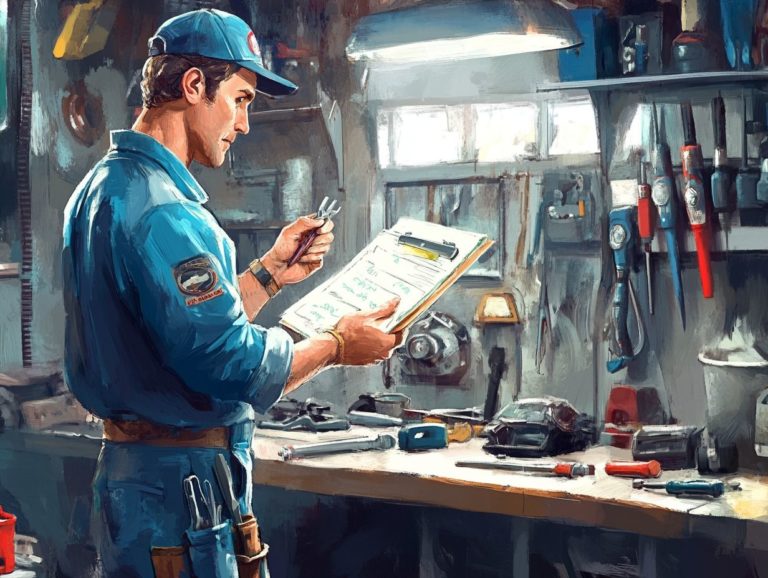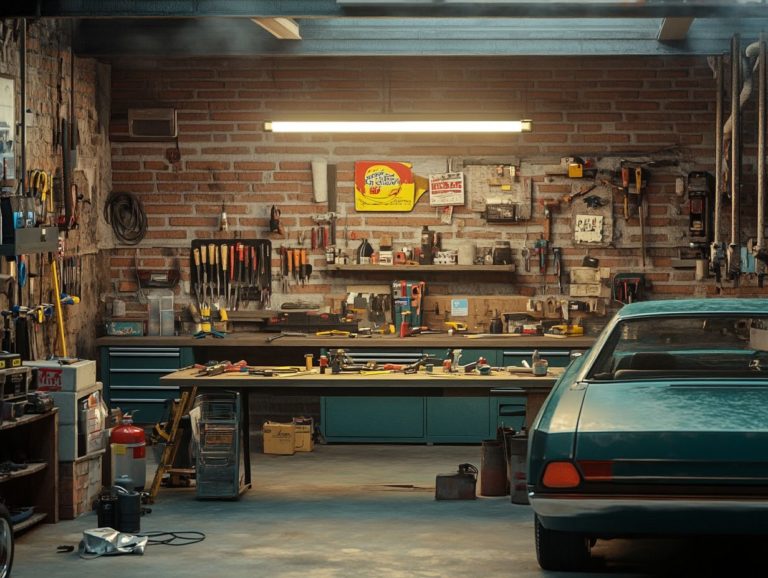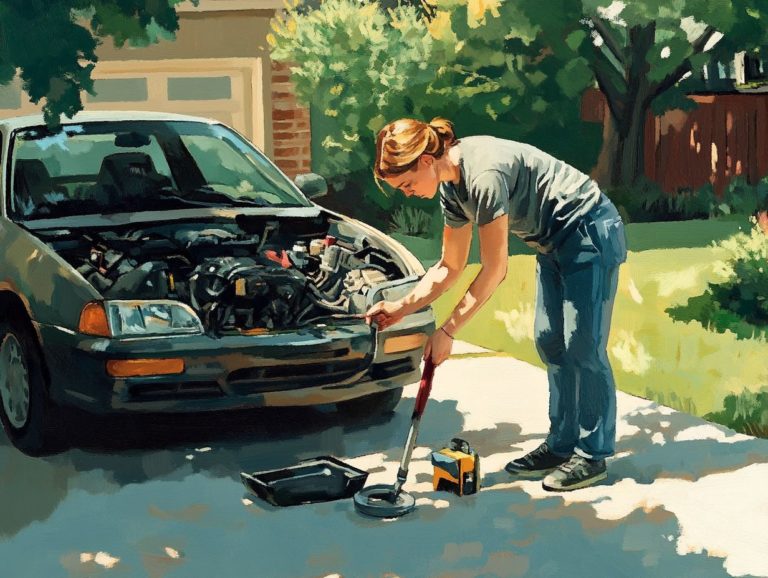Understanding Common Car Repair Costs
Car repairs can often take you by surprise, both in terms of urgency and expense.
Numerous factors influence these costs, ranging from the severity of the issue to the specific make and model of your vehicle.
Let s dive into the most common repairs you might face, such as brake, engine, and transmission fixes, offering you a clear understanding of potential costs involved.
We also provide practical tips on how to save money on repairs through regular maintenance and smart shopping strategies.
Continue reading to equip yourself with the knowledge needed to navigate car repair expenses effectively!
Contents
- Key Takeaways:
- Factors that Affect Car Repair Costs
- Common Car Repairs and Their Costs: What You Need to Know
- Smart Tips to Save on Car Repairs
- Frequently Asked Questions
- What are common car repair costs?
- Why is it important to understand common car repair costs?
- What are some examples of common car repair costs?
- How can I estimate the cost of a car repair?
- Are there any ways to save on common car repair costs?
- What should I do if I encounter a car repair cost that seems too high?
Key Takeaways:
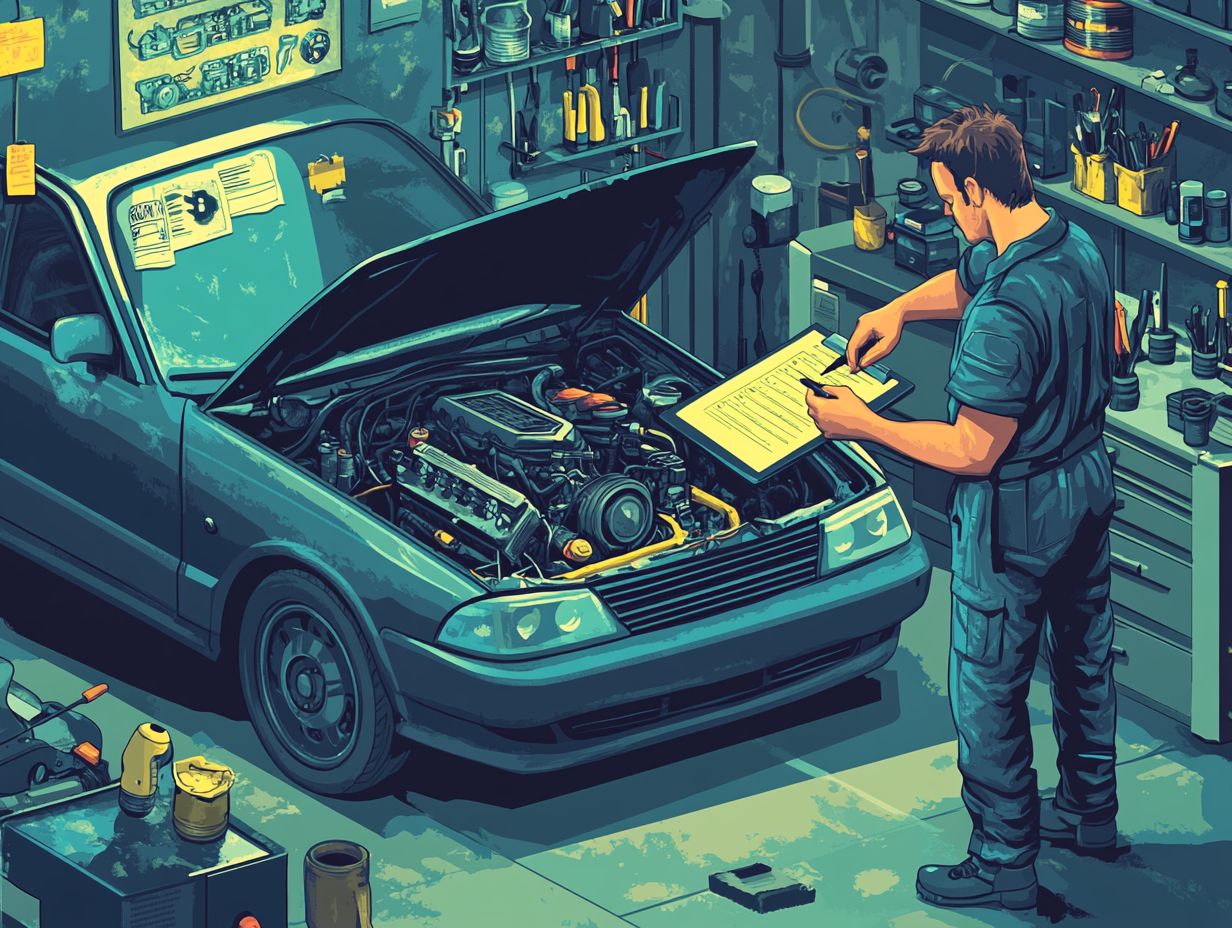
- The severity of the issue, vehicle make and model, and location and mechanic fees are major factors that affect car repair costs.
- Common car repairs such as brake, engine, and transmission repairs can vary in costs depending on the severity and type of repair needed.
- Regular maintenance, DIY repairs, and comparison shopping for parts and labor are effective ways to save on car repair costs.
Factors that Affect Car Repair Costs
Understanding the factors that influence car repair costs is essential for any vehicle owner looking to manage their budget with precision.
In a landscape where car maintenance can lead to unexpected repairs, whether you re behind the wheel of a luxury Mercedes-Benz or a dependable Ford, it s important to take various elements into account.
The severity of the issue, the type of vehicle you possess, and even your location can all play significant roles in determining the average costs of necessary repairs and maintenance services.
By grasping these factors, you can avoid those unexpected costs that could strain your budget!
Severity of the Issue
The severity of the issue at hand plays a crucial role in shaping repair costs.
Consider how minor maintenance tasks like an oil change stand in stark contrast to fixing a major car part, such as a transmission overhaul.
For instance, while a routine oil change might only set you back a modest amount, the costs for more extensive issues like brake replacements, engine repairs, or suspension work can escalate dramatically.
These common repairs not only vary widely in price but also significantly impact your overall vehicle maintenance budget.
Understanding the range of potential repairs helps you anticipate expenses and manage your finances effectively.
So, whether you’re facing a simple tire rotation or a costly engine rebuild, stay informed to make the best choices for your wallet!
Vehicle Make and Model
The make and model of your vehicle can significantly impact your repair costs.
Luxury brands like BMW or Lincoln often come with a heftier price tag compared to more common names like Honda or Chevrolet.
This variation in costs arises from multiple factors, including the availability of parts, the complexity of the technology in these vehicles, and the mechanic fees charged by specialized mechanics.
For example, a luxury sedan may require specific diagnostic tools and high-quality components that are much harder to source than those for a popular family car.
If you own a Honda or Chevrolet, you might enjoy fewer unexpected expenses in your maintenance budget, leading to greater predictability in your overall ownership costs.
Grasping how these distinctions affect your financial planning is vital for any vehicle owner.
Location and Labor Costs
Location and labor costs play a pivotal role in determining the overall repair expenses associated with your vehicle, as different regions offer varying rates for mechanic services.
In urban areas, for example, higher wages are often the norm due to the increased cost of living, which inevitably inflates repair prices.
Conversely, while rural regions may present more budget-friendly options, they can also face limitations in service availability.
Grasping these geographical disparities is crucial, especially when you’re budgeting for unexpected vehicle repairs that can swiftly transform into emergency costs.
Preparing for such expenses underscores the importance of setting aside dedicated funds for automotive needs, ensuring you’re well-equipped to tackle these financial surprises without straining your wallet.
Common Car Repairs and Their Costs: What You Need to Know
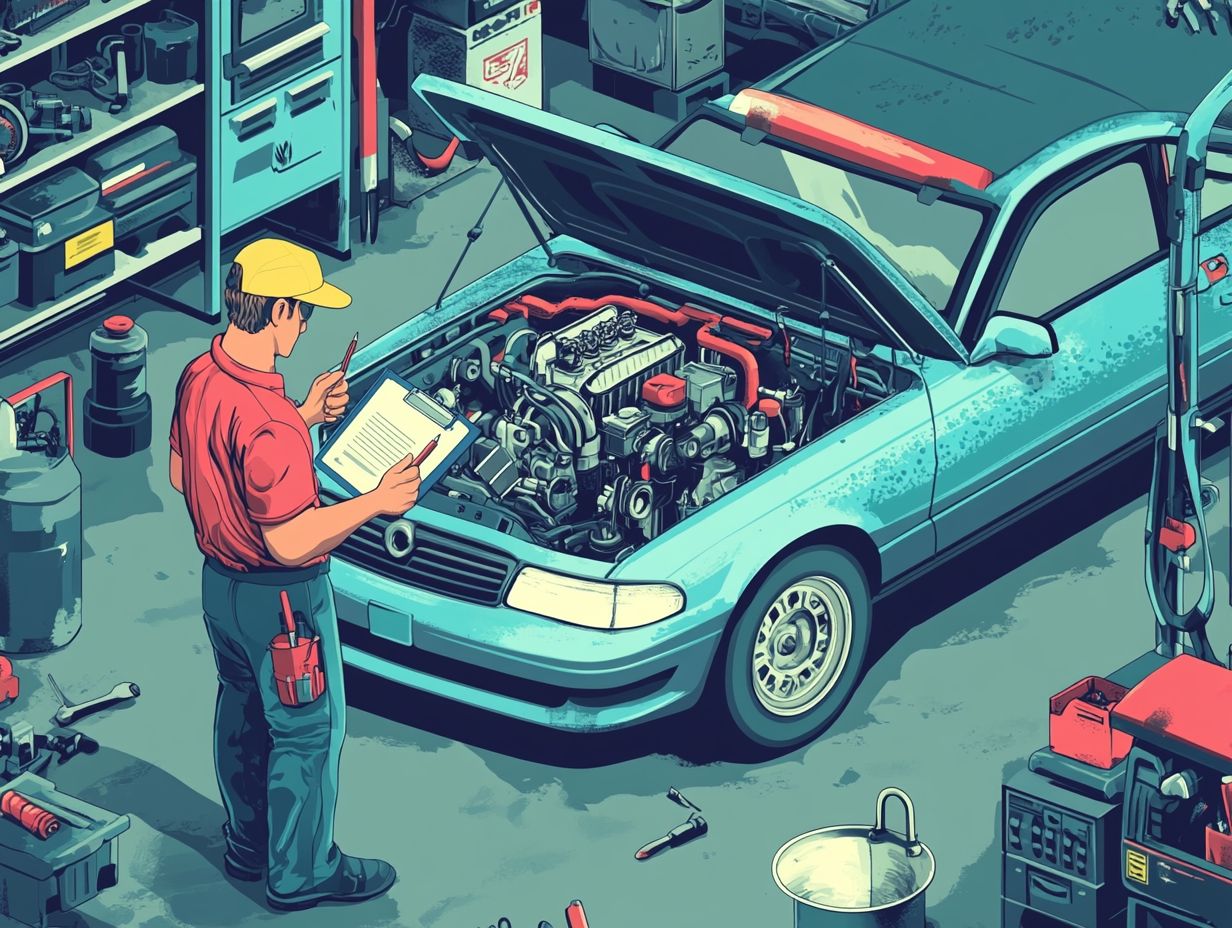
Understanding common car repairs and their costs offers you valuable insight as you navigate the expenses of vehicle ownership. Essential services like oil changes, brake repairs, and tire replacements are crucial not just for your safety but also for your overall maintenance budget.
Familiarizing yourself with repair estimates for different vehicle types, whether it s a compact sedan or an electric car, will help you prepare financially for routine upkeep and those surprise expenses.
Brake Repairs
Brake repairs are essential for safety. Replacing brake pads usually costs between $100 and $300.
Don t wait! Neglecting timely maintenance can lead to skyrocketing repair bills and jeopardize your safety on the road. Various repairs may include rotor resurfacing, brake fluid changes, and repairs on the part that holds the brake pads, each with its own price tag.
For instance, while replacing brake pads may cost you $100 to $300, rotor replacement could push that bill to $400 or more. Recognizing the vital need for optimal braking performance highlights why you should prioritize prompt repairs and regular maintenance.
Engine Repairs
Engine repairs can vary widely, ranging from minor fixes to significant overhauls. These repairs can bring unexpected costs that strain your budget.
They may encompass everything from straightforward oil changes and spark plug replacements to more intricate issues like timing belt replacements or complete engine rebuilds. Minor services typically cost a few hundred dollars, while extensive work can easily escalate into the thousands.
To manage these financial surprises effectively, set aside an emergency fund dedicated specifically to automotive repairs. Understanding repair estimates can greatly assist you in making informed decisions.
Transmission Repairs
Transmission repairs are complex and costly. The intricacies of diagnosing transmission issues can lead to significant repair expenses.
Proper maintenance is vital; regular checks and fluid changes help you sidestep major failures that require extensive work. By prioritizing upkeep, you enhance the longevity of your transmission and protect your vehicle’s overall performance.
Neglecting this crucial component can lead to decreased responsiveness and even more expensive repairs down the line. Proactive care is essential for maintaining your vehicle’s health.
Smart Tips to Save on Car Repairs
Finding ways to save on car repair costs is crucial for any discerning vehicle owner. By implementing regular maintenance and smart budgeting, you can significantly minimize unexpected expenses.
Establishing a solid maintenance schedule and considering DIY repairs helps mitigate high repair costs while extending the lifespan of your vehicle. Engaging in comparison shopping helps you secure the best deals, especially for routine services like oil changes or tire replacements.
Regular Maintenance and Inspections
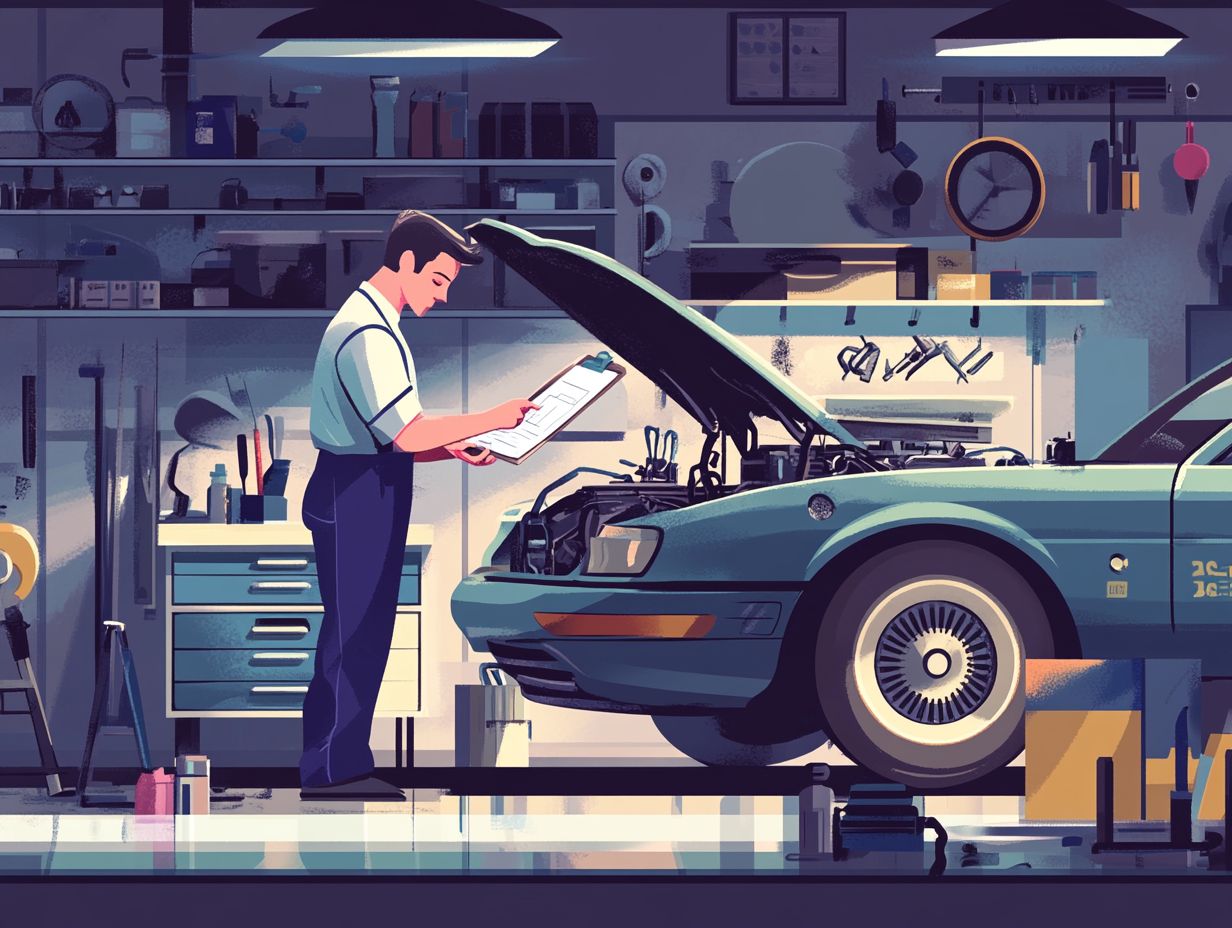
Regular maintenance and inspections are essential aspects of responsible vehicle ownership that can help you avoid unexpected repairs and extend the lifespan of your car.
By following a well-structured maintenance schedule, you ensure that important parts like brakes, tires, and engines are in good working order. This significantly reduces the chances of incurring unforeseen expenses.
For example, timely oil changes not only enhance engine performance. Routine inspections can uncover potential issues before they escalate into costly repairs.
This proactive approach makes your car safer and more reliable on the road. Ultimately, it saves you both time and money.
Developing these habits contributes to your overall peace of mind, allowing you to enjoy your journeys without the nagging anxiety of unexpected car troubles.
DIY Repairs
Engaging in DIY repairs is a savvy way for you to cut down on car repair costs, enabling you to handle minor fixes without calling in a mechanic.
Take routine oil changes, for example. Not only do they extend your engine’s lifespan, but they also save you a substantial amount compared to what you’d pay at the shop.
Similarly, replacing worn brake pads is a straightforward task that pays off in both safety and cost-effectiveness.
By investing a bit of your time and effort into these common repairs, you not only keep your vehicle running smoothly but also feel a rewarding sense of accomplishment.
Plus, learning these skills deepens your understanding of car maintenance. This enhances your ability to tackle future issues without relying solely on those pricey mechanic services.
Take charge of your vehicle’s maintenance now! You’ll save money and feel accomplished.
Comparison Shopping for Parts and Labor
Comparison shopping for parts and labor is an essential strategy for you as a vehicle owner who wants to manage maintenance costs effectively while ensuring you receive top-notch services.
By taking the time to gather multiple repair estimates, you can gain a clearer understanding of the fair market price for various services.
This process not only helps you identify the most economical options but also reveals any significant discrepancies in pricing that could suggest overcharging.
With a better grasp of average costs, you can budget more effectively for both routine maintenance and those unexpected repairs that tend to pop up.
Ultimately, comparing prices enables you to make informed decisions, giving you the confidence that you re investing wisely in the longevity and performance of your vehicle.
Start comparing quotes today to ensure you’re getting the best deal for your vehicle!
Frequently Asked Questions
What are common car repair costs?
Common car repair costs refer to the expenses incurred for repairing or replacing parts of a vehicle that are prone to wear and tear or damage over time. To navigate these expenses effectively, it’s helpful to become familiar with common car repair terminology. These costs can include routine maintenance, unexpected repairs, and part replacements.
Why is it important to understand common car repair costs?
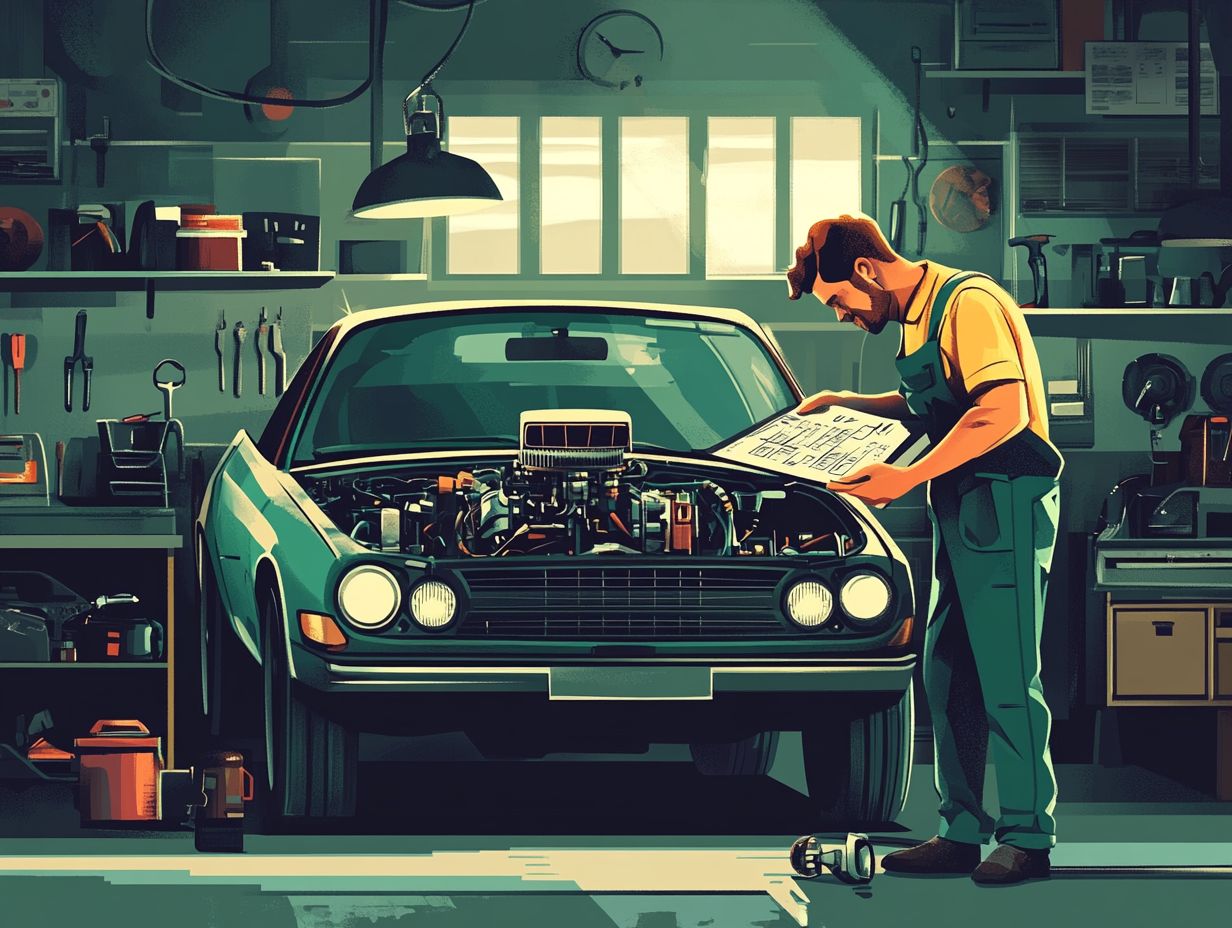
Understanding common car repair costs can help you budget for potential expenses and avoid being caught off guard by unexpected repairs. Familiarizing yourself with understanding the most common vehicle repairs can also give you an idea of the general cost of owning and maintaining a vehicle.
What are some examples of common car repair costs?
Common car repair costs can include oil changes, tire replacements, brake repairs, and engine tune-ups. For those looking to save on expenses, understanding common car repair warranties can provide valuable insights, especially for more significant repairs, such as transmission replacements or engine overhauls, which may also fall under this category.
How can I estimate the cost of a car repair?
The cost of a car repair will vary depending on factors such as the type of repair needed, the make and model of your vehicle, and your location. You can ask for quotes from different mechanics or use online resources to get an estimated cost.
Are there any ways to save on common car repair costs?
One way to save on common car repair costs is to regularly maintain your vehicle and address any issues promptly before they turn into more significant problems. You can also shop around for the best deals and consider using aftermarket parts instead of original manufacturer parts.
By understanding car repair costs and taking proactive steps, you can keep your vehicle in top shape and your budget intact.
What should I do if I encounter a car repair cost that seems too high?
If you get an estimate that feels too high, don t panic! Seek a second opinion from another mechanic.
You can also look up the repair costs online to compare with the quote you received. If you still have concerns, ask for a detailed breakdown of the costs. Don t hesitate to negotiate a better deal!


